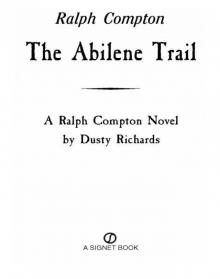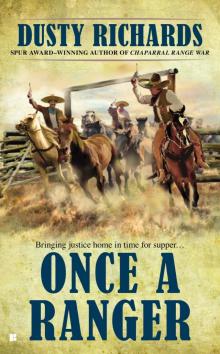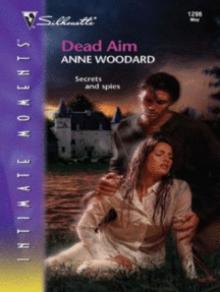- Home
- Dusty Richards
Massacre at Whip Station Page 3
Massacre at Whip Station Read online
Page 3
“Okay,” he said to someone inside. “You, then His Honor.”
Another man emerged, taller and not so round. He was the owner of the arm that had passed out the gun belt. He was somewhat younger, maybe seven or eight years, but dressed the same and carried a carbine similar to Ocean’s. He had a big mustache and dark, hard eyes. He shook out a cramped leg before starting down the stairs.
There was a scar across the man’s jawline, a knife—or bayonet?—wound, Sarah thought. He held the carbine in both hands, ready to put it to his shoulder for a quick discharge. This man had seen war.
Once the second man was out, a third figure emerged. He had to bend at the waist to pass through the door. Sarah did not know how he had been able to sit upright inside the stagecoach.
This passenger did not look the same as the other two. He was an Indian, not just half-a-head taller but the color of the sunset and dressed in a blanket adorned with symbols. He wore a multicolored glass pony bead neckpiece that covered the top half of his chest and several arm and wristbands of the same materials. A skirt made of buffalo hide covered him from just above the waist to above the knees. Leather bands encircled his lower legs. His moccasins were covered in snakeskin. Clutched in his left hand was a pow-wow headdress with feathers spraying from the top and center—not along the back, as she had seen in other noted Indians. He wore a large cow’s-ear medicine bag strung from the right-side waistband of his skirt.
He did not look around, did not speak. He placed the headdress on with more the kind of pride that had been lacking in the other man when he donned his hat. Then the Indian waited for the man with the six-shooters to gesture where he was to go—which was to the station. The two white men stood on either side of the other as they departed. Only when they were gone did the remaining passengers emerge—all of them from one side of the coach, the rear bench.
“That added delay was an insulting and unnecessary show of federal hubris,” said the first passenger to emerge.
This passenger was about fifty, with a full salt-and-pepper beard and mustache, spectacles, a white shirt, a floppy black bow tie, and old cigarette ash on his blue, four-pocket cotton vest. His trousers were black canvas and his boots were coated with dust—St. Louis dust, Sarah knew. She had seen that color and thick, clinging coat before. There were pencils and a notepad in two of his pockets, a tobacco pouch and cigarette paper in the third and fourth. The man greeted his hostess with a grunt and walked off to roll a smoke.
The next man out was younger, maybe thirty. He was dressed in a frock coat and cleric’s neckpiece. He stepped down first and turned to help a lady down the stairs. She had a round, open face with large blue eyes and a small, straight mouth. A petite woman who looked to be in her twenties. She wore a pinstripe blouse and matching dress with a thick black belt. The lady graciously accepted—but clearly did not need—the preacher’s helping hand. When he released her, she immediately put on a white muslin bonnet. Sarah recognized the woman’s urgent attention. The hat wasn’t to protect her from the sun but to conceal what she must have felt was the disarray beneath it.
Or, Sarah thought after observing the way the woman looked away, to hide her face?
These last two arrivals stood at the foot of the stairs, as though lost, and Sarah finally stepped forward.
“I’m Sarah O’Malley,” she said with her lightly dusted German accent to the lady passenger.
The younger woman half-regarded Sarah but did not speak. She was most assuredly guarded. The man spoke up.
“I am the Reverend Merritt Michaels,” he said in a pulpit-clear voice that was nonetheless dry with the dust of travel. “This is my sister, Miss Clarity Michaels.”
“I am happy to make your acquaintance,” Sarah said.
“Forgive my—our—hesitation,” the gaunt man said with a wide, practiced smile. “It was a harrowing journey to my new parish even before . . . before the gunplay.”
“I understand, of course, and will do my best to make your brief visit comfortable.” Sarah smiled.
Still looking away, the lady tried to take a step and stumbled. Sarah caught her by the elbow.
“I’m very sorry,” Clarity said, reddening with embarrassment from her near-fall.
“No need,” Sarah assured her. “You have been through a great deal.”
Clarity finally faced the woman fully. Her lips formed a half smile. “Yes, an arduous great deal,” she agreed.
They continued forward, Clarity’s arm hooked in that of her brother. He was self-consciously stiff-legged as they walked.
“Be assured that coach cramp is common,” Sarah assured both Reverend and Clarity Michaels.
Sarah was referring to one of the most devilish aspects of coach travel. Unlike the threat of Indians and bad weather, of breakdowns and uneven terrain, immobility was a constant, certain reality. Riding as they did, packed in a too-small cabin with knees interlocked for hours on end, most passengers were unable to regain their legs quickly. In this case, with the three bigger men on one side, it would have been especially hard on those sitting across from them.
“I suspect that coach boorishness is frequent as well, I’m sure,” Clarity said as they continued toward the station.
“I don’t understand,” Sarah said.
“My sister was trying to look out the window during the excitement,” the reverend said. “That—that big, rude man, Mr. Kennedy, actually kept her from moving by locking his knees around hers.”
“No doubt trying to protect Miss Michaels,” Sarah suggested.
“I do not think so,” the woman said, speaking more and more frankly than most ladies in Sarah’s experience. “He wanted to prevent me from drawing the curtain.”
“Again, for safety no doubt,” Sarah remarked.
Clarity looked at Mrs. O’Malley, who was to her brother’s right. “Did he look like a man who was concerned for the safety of a fellow passenger?” she asked.
Sarah had no opinion, nor would she have spoken it if she had. One of the jobs of station mistress was also to keep the peace, tempers often tending to be raw at this point in the journey.
“There’s cool water and a warm welcome inside,” Sarah told her, falling back on her standard welcome. “You’ll soon feel yourself.”
Once again, Clarity showed her a half smile, then turned away.
“That adventure just before we arrived,” the reverend said. “Is that common, too?”
“Not at all,” Sarah replied. “I am sure my father will be taking measures to make sure there is no—”
Reverend Michaels gasped, interrupting her, as they neared the door. Sisquoc and Malibu were standing just inside the back door, startling him with their dark faces and dour expressions. Mr. Kennedy went over to them, his back to the others.
“They are soldiers,” Sarah assured Reverend and Clarity Michaels, though it was only the clergyman who had been startled.
“I thought—it might be whoever fired at us,” he said.
“I am sure Mr. Kennedy is making sure they are not,” Clarity said.
“I was asking if they knew anything about the attack,” Kennedy said, returning to the table. “They say the fort had no specific information about trouble.”
Sarah ushered the two toward the long table in the dining area of the station.
“Why don’t you sit here while I get some water,” she said.
“Thank you,” Reverend Michaels replied. “I confess—I am not used to travel. It’s made me a little excitable.” To the Indians he said, “We are all God’s creatures.”
“Amen,” said Gert.
“One thing you have to get used to out here, even in San Francisco, is Indians,” said the other man, the one who had rolled a cigarette and was smoking it at the table. “They will be in your church, most likely. In the back, along with Coloreds and Mexicans, but they will be there.”
“As I said,” Reverend Michaels replied, “I am not myself. All are welcome to God’s embrace.”
/> “May I ask why you decided to make this trip?” the other man asked.
It was Clarity who answered. “I shot a man.”
CHAPTER 3
Upon entering the station, Slash and Joe O’Malley brought Ocean to a small room at the rear. Half underground, the room doubled as a bed for the coach driver, a nursing facility for the injured or faint, and a root cellar. They brought the man, bleeding and moaning, to a Civil War hospital cot set up in the center.
B.W. had paused to check the wheel, left rear, that had gone over the rock back at Civil Gulch. There was a hairline crack in one of the spokes and he went to the stable and asked Jackson to patch it with pitch.
“I should replace it,” he said.
“Two hours at least,” B.W. said. “And we got trouble chasing us.” He shook his head. “Patch it.”
“It’ll take a sunny half day to completely dry,” Jackson said.
“I know that, so I’ll take ’er easy,” B.W. said. “We got a schedule.”
“Sure thing,” Jackson said. He took a moment to study the man. “I ain’t seen you this fidgety since those Spencer repeaters came out here and you were worried that the Indians would get them.”
“Army’s got greasy fingers and greedy pockets,” he said. “I got reason to worry. We all do.”
Jackson saw to the repair right away, hoping it would harden enough under the direct sunlight to keep it from splitting completely.
B.W. held his Bible tightly in his left hand and prayed for a warm wind to help the wood heal. Tucking his Bible under his armpit, he entered the room where the men had lain his injured shotgun rider down.
“Smells like a compost heap,” the driver complained.
“Gert says the smell of herbs and vegetables have a curative quality,” Slash informed him.
“Not ‘smell,’” Gert corrected. “‘Aroma.’”
The young woman entered behind them, wearing an apron and carrying a lantern. She hung the light from a hook over the cot, then went to get their first aid supplies. Some were from an abandoned Union outpost, others from an Apache settlement over the border in Arizona. She set them on the floor beside the cot.
“You learn that wisdom from the Injuns?” the driver asked with more than a hint of disapproval.
“Directly from,” Gert said.
Joe left, his frowning and intense look suggesting how much he disliked his granddaughter fraternizing with the local Indian population. He went outside and got his gun from where he’d left it against the fence, brought it inside, and set it beside other carbines standing in a corner. In case of an Indian attack, everyone in the station knew where those guns were and could find them in the dark.
“Ever think they might want to kill us with such talk?” B.W. asked, unaware of what had passed between Joe and Gert. “Y’know, tell us something is good, like rattler venom, if you mix it with other ingredients.”
“Don’t be foolish, Brother Whip,” snapped Gert.
“Don’t be insulting,” Joe warned her over his shoulder.
Gert acknowledged Joe’s admonition. She continued more pleasantly, “What God provides to feed the insides also heals the outsides.”
B.W. shrugged and stepped back as Slash used his knife to skillfully cut away the wounded man’s trousers leg. Ocean was wincing, snorting hard as the fabric tore away from the dried blood, taking hair and some skin with it.
When Slash finished, Gert moved in.
“Fetch water and whiskey,” Gert said to B.W., adding loudly for the sake of her grandfather, “if you please, sir.”
“Liquid cures, coming up,” B.W. said.
“Slash, please bring bandages, towels.”
When the men were gone, Gert carried over a stool and sat beside Ocean. Like her strong voice, her long face with deep-set brown eyes and strong cheekbones—reminiscent of her grandfather—were set on her task.
“I appreciate . . . your help,” Ocean said through his teeth. “You gotta do one thing more for me.”
“What is that?”
Before he could ask, B.W. arrived with a ceramic basin filled with water. Gert set it on the floor and dipped a cloth in it.
“Why don’t you just lie still,” she told Ocean.
“I will, but I have to say what I was gonna tell you,” he said. His pained eyes shifted to B.W. “Brother, don’t leave without me.”
“Dick, I’m not meaning to be heartless but you know we have a schedule.”
“I know. You’ll keep it better with me. Just give me time to get fixed, set a bit.”
B.W. looked down sadly and Gert shooed him away.
“Mr. Ocean, I heard Slash tell Grandpa it was white men who shot at you,” she said, wringing out the cloth.
“It . . . was.”
“From concealment?”
Ocean nodded. “At first,” he said. “Then . . . they . . . chased us.”
Gert carefully dabbed around the wound. Caked blood came away but fresh blood immediately filled the opening and spilled down his skin.
“And they call the Red Men ‘savages,’” she lamented quietly.
“Everyone out here . . . is a little . . . rough,” he said.
Gert admired the man’s evenhanded thoughts but did not embrace them. However, this was not the time or place to voice her views. She put the cloth in the basin and picked up a strip of leather. It was part of a bundle of tools that had once been used for amputations. She fed it under the thigh of the injured man.
“Hold!” Ocean blurted, straining and rising urgently on his elbows. “You’re not—”
“No, no,” she assured him. “I am not cutting. I have to tie the leg off to stop the bleeding.”
“Not a tall O’Malley tale?”
She shook her head. Every time the shotgun was here, and Joe or his granddaughter mentioned to passengers some of the things they’d seen, Ocean always felt they were dressing it up for the folks. Joe wouldn’t, though only Gert ever bothered to say that the world out here was different—ancient, unknowable, and deeply contemptuous of human attempts to tame it.
Ocean nodded with understanding and lay back. The man had seen enough out here to know, however, that it was going to hurt. She took a leg bone of chicken from the bucket that was headed for the backyard compost and put it between his teeth. He gripped the sides of the cot and locked his teeth around the dry bone as Gert loosely bound the free ends of the strap together—then quickly pulled them tight.
B.W. was standing in the doorway holding a bottle of whiskey.
“Should I pour him a slug?” he asked, holding up the bottle.
“No,” Gert told him. “What you can do is kneel beside me and set the bottle on the ground.”
“Kneel?”
“By the bed here, if you don’t mind.”
B.W. looked confusedly from the woman to Ocean, then did as he was told.
“I want you to look overhead, at the garlic,” Gert instructed Ocean.
As soon as he had done so, she removed a little leather kit from the apron. She set it between Ocean’s slightly parted legs, opened the pouch, and selected a small paring knife.
B.W. looked at it and his face tightened. Gert nudged him with her knee. He realized what he was doing, that Ocean might see him, and he relaxed.
* * *
Slash returned then and Gert instructed the men to hold Ocean still—B.W. leaning on his arms, her brother on his legs. When that was done, Gert opened the liquor bottle, poured some on the bullet hole, and immediately put the scalpel into the wound. The bullet was not visible, which meant she would have to dig for it.
“Bite hard,” she cautioned Ocean.
He did and screamed through the bone as she circled the blade around the interior wall of the injury. The young woman probed gently but deeply for the bullet, pushed the blade beneath it, and popped it out. Blood splattered everywhere as the bullet jumped free, landing on the dirt floor. She immediately poured more whiskey on the wound, dropped the knife in the
basin, and placed a towel on Ocean’s thigh.
“Press down on this with your palm,” she instructed B.W.
While the driver did as he was told, Gert unwrapped a len’th of bandage. Bending close to determine that the bleeding had slowed, she motioned B.W. aside. He raised his hands and stood.
“You too,” she told Slash.
The young man released Ocean and stepped back. His sister turned several len’ths of white fabric around Ocean’s leg, then removed the leather strap and retied it over the bandage to hold it in place.
“Don’t move,” she instructed her patient.
“Wasn’t . . . planning on . . . dancing . . .” he wheezed.
Gert grinned and swished the knife in the bloody water before replacing it in the kit. She swished her own bloody fingers in the basin, wiped them on the towel, and rose.
“Everyone out,” she said. “He needs to lie still. Let the plants help him recover.”
“For how long?” B.W. asked.
“You can pick him up on the way back,” she said.
“I was afraid you’d say that,” B.W. said glumly. “After what happened, I can’t go without a shotgun.”
“You can get someone else to ride in the box,” Slash suggested. “One of the two dudes?”
B.W. shook his head. “Those guards have to be inside with the Injun.”
“You know that he’s a Serrano shaman, don’t you?” Gert said, openly disapproving of his ignorance.
“Is that what he is?” the driver asked.
Gert nodded. “His beads tell the story.”
“Well, Miss O’Malley, shoot me for a cur but I can’t read English or necklace,” B.W. replied unapologetically.
“You seem almost proud of that,” Gert said.
The driver shrugged. “A man shouldn’t be ashamed of who he is.”
“Both of you get out,” Gert repeated, waving them toward the door. “This man needs to rest.”
Taking the lantern, Gert recovered the bullet from the dirt floor and followed the men out.
Slash took B.W. aside just outside the root cellar.
“How’d ya feel about me riding with you?” he asked.

 Massacre at Whip Station
Massacre at Whip Station Blue Roan Colt
Blue Roan Colt The Abilene Trail
The Abilene Trail Valley of Bones
Valley of Bones Noble's Way
Noble's Way Blood on the Verde River
Blood on the Verde River The O'Malleys of Texas
The O'Malleys of Texas Pray for the Dead
Pray for the Dead Arizona Territory
Arizona Territory Servant of the Law
Servant of the Law Montana Revenge
Montana Revenge The Sundown Chaser
The Sundown Chaser A Good Day To Kill
A Good Day To Kill Deuces Wild
Deuces Wild Deadly Is the Night
Deadly Is the Night Texas Blood Feud
Texas Blood Feud Wulf's Tracks
Wulf's Tracks Rancher's Law
Rancher's Law Sharpshooter
Sharpshooter Once a Ranger
Once a Ranger Dead Aim
Dead Aim Lawless Land
Lawless Land Brothers in Blood
Brothers in Blood Waltzing With Tumbleweeds
Waltzing With Tumbleweeds